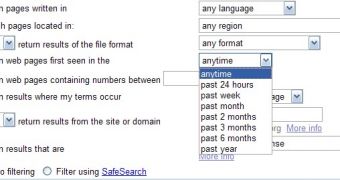Going to Google's advanced options gives you the option to select how far back the search engine will look for returns to your query. Not the most common or the most advertised of options, but it is definitely something worth giving a try because it will on occasion save you a lot of trouble and save you some precious time.
The options you're given are true to the typical search span. Anytime being selected by default, you can change it into 'past 24 hours,' 'past week,' 'past month,' 'past 2 months,' 'past 3 months,' 'past 6 months' and 'past year.' There's no need to underline how important accurate and fresh information is when you're looking for something in particular, but I would like to highlight that the search results will in fact give you a specific date for when the article was posted, or for when the page was created.
That's particularly useful for when you want to separate rumors of something from real fact. Say you know event X happened in October, but it has been discussed about for months before. The only choice available would be 6 months, and by looking at the date of the article you get to see if it was written before or after the period you had in mind.
Ionut Alex. Chitu of Google Operating System mentioned a while ago that users could edit Google's URL to customize how fresh the search results should be, by adding at the end of the search URL &as_qdr=[period of time]. A search for results indexed in the past 9 years, for example, would have you adding &as_qdr=y9.
I'm looking forward to the day when all search results will be time stamped, because this is a very important aspect, requested on repeated occasions. This has just been the first step.

 14 DAY TRIAL //
14 DAY TRIAL //